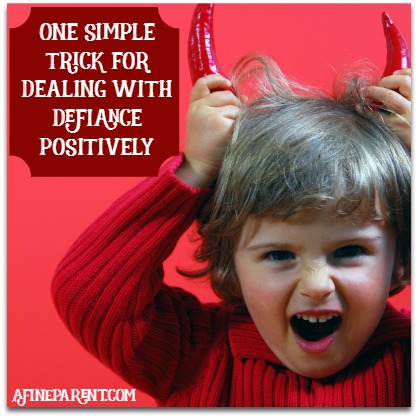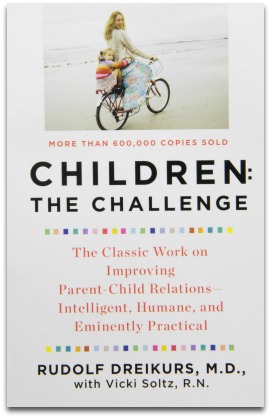 Everybody loves a defiant child, right?
Everybody loves a defiant child, right?
Riiiiiight….
We love to be verbally abused and ignored. We love to be at our wits end, feeling as though we have to be bigger, stronger, louder to get our point across. We loooooove using intimidation and bribes as we work to coerce a child into cooperation and obedience.
Except that we don’t. Present, loving parents don’t enjoy those tactics. We feel as though we have failed our kids, as though we are fail-ing as parents. We feel as though we have lost the battle.
And to be honest, when we go to those places of threats and bribes, we have lost. We have lost our way and for sure have stepped off the path of present, positive parenting.
But what are we supposed to do with these kids???
Well, let me tell you something that I have learned in my nearly 20 years of working with kids and families. There is always so much going on under the surface. Alfred Adler, one of the first social psychologists, whose work is the foundation of Positive Discipline, found human behavior to be movement in the direction of belonging and significance.
Yup, our behavior has to do with how we perceive and make meaning of how we fit and if we matter.
Let’s take that defiant child. What is happening for her? She resists requests, she may be passive aggressive or combative or want to argue about everything. She may be really stubborn.
And what can happen for the grown up? Well, we can find ourselves feeling pulled into the fight, puffing up with our “authority.” We may feel provoked, indignant or resentful that this child seems to think she can call all the shots.
We typically respond one of two ways – we fight to prove that actually WE are in charge, or we retreat, giving up, feeling as though there is no use…
This is a tough place to be. If you currently find yourself here with your child, know that you are not alone, and there is a third option.
 Curiosity.
Curiosity.
I know, it might sound weird, but curiosity can be a fabulous tool on the path to connected, present parenting. Curiosity allows us to drop our assumptions, drop our beliefs about our child, and to show up as helpful and available, rather than hurtful.
 According to Rudolf Dreikurs, student of Alfred Adler and author of Children: The Challenge, our behavior is the result of our own biased interpretations of the world. What this means is that we move through life, making meaning and decisions for action, based on our own individual lens.
According to Rudolf Dreikurs, student of Alfred Adler and author of Children: The Challenge, our behavior is the result of our own biased interpretations of the world. What this means is that we move through life, making meaning and decisions for action, based on our own individual lens.
And guess what? Our children have individual lenses they see the world out of too! Their experiences, feelings, and conclusions about life and their role in it are real and valid to them. Sometimes, our kids feel as though they don’t get to make any decisions or have much control over their day…. Or maybe they feel as though what they think just doesn’t matter to their parents… Or perhaps they feel as though they don’t have any power, so they take it where they can get it?
And while we can spend all day talking about what we think is happening for our kids, we can only really know what our child’s experience is when we ask them.
Here is what curiosity can sound like with a defiant child:
- I am noticing you aren’t ready to go, can you tell me a little bit about that?
- It seems like I have been doing a lot of nagging you, what do you notice?
- I am wondering if you would like more choices? If you feel like I am the one making all the decisions?
- How can we solve this problem?
- What are your ideas?
The idea here isn’t to manipulate your child into doing what you want them to do, but rather, to invite them into relationship with you. A child who feels connected (belonging) and as though what they do/say matters (significance) is going to show up much more cooperative and helpful.
Curiosity requires open-ended questions. It requires compassion and non-judgment. It requires a willingness to really listen to our children. It is not a time to tell them they are wrong or talk them out of their perspectives (however misguided they may be) – instead we want to connect with our kids, to help them begin to experience how to belong and to matter in a new way.
Curiosity opens the door to learning… Learning about our children and how they perceive the world around them. Curiosity is a steppingstone to deeper, more authentic relationship. This is huge because the most powerful tool we have for influencing behavior is the relationship we develop with our kids.
What you will find, as you look for ways to connect and get to know your child’s perspective, is that the defiance will no longer be the default way they interact with you. When you take time to share power and give choices, when you own your own behavior and the way it is felt/experienced by your child, they will know how much they matter, and the power struggles, aggression, and resentment will decrease.
Brilliant Blog, sharing tomorrow on facebook.com/GreatParentingShow
Brilliant Blog, sharing tomorrow on .facebook.com/GreatParentingShow/
I love this idea, it really is fantastic. Thank you for sharing this xx